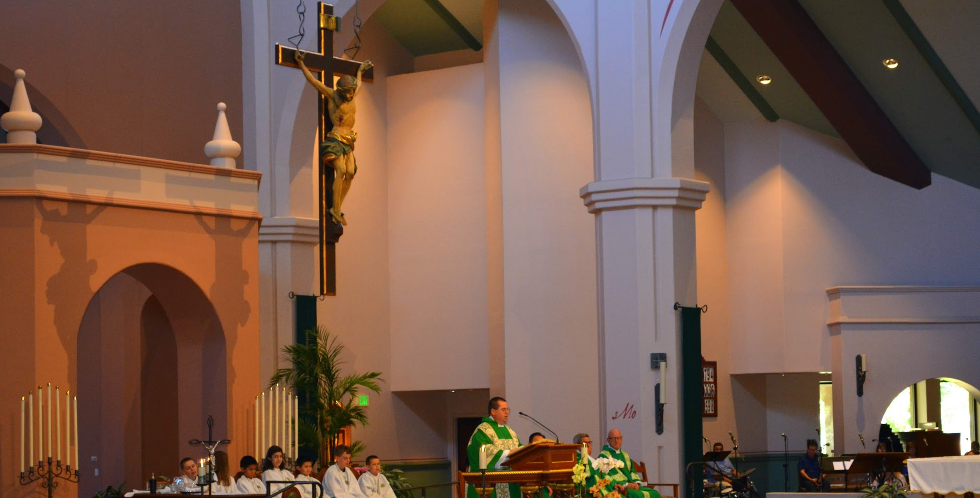Introduction
You’ve likely come to this page because you have a blessed item with a little sticker on it that says:
Blessed by Deacon Crawford
Do not throw away!“
…and then directs you to this web address. First of all, thank you for respecting that little sticker. It’s important! See, the item with the sticker has been blessed by a Catholic Deacon (me!). That means it should be treated as a holy item. And what that means is that it should never be thrown away or discarded casually. If it is broken or damaged and can no longer be used, it needs to be disposed of respectfully. Blessed items should never be treated like trash. Ideally you can find a way to fix it or make use of it in some other way beyond its original purpose. But of course, sometimes something becomes damaged beyond any value and must be disposed. This little webpage will teach you how (if you must).
Options for disposal
There are two options for disposal:
- Burial
- Burning
Burial
The normal method of disposing of a blessed items like statues or rosaries is to bury it. At some level it is as simple as it sounds. Go into your backyard (or somewhere else appropriate), dig a hole, and place the item in the hole and fill the hole. However, we should a bit careful about where this hole is dug. If it’s somewhere that there’s a high probability will be disturbed and the items dug up and improperly strewn about, that’s not a very good place. We should try to pick a place that the item will have decomposed before the area is dug up. One idea is that if you’re planting a new tree or large plant/shrub, put old religious items at the bottom of the hole before you bury the root ball. Or perhaps if you’re buidling a deck or patio, dig a small hole for it under where there will be concrete poured. As an extra bonus you can have the joyful feeling that your tree, deck or patio is built on the foundation of something holy!
Yet another option is to bury them with a person. I haven’t heard of many people doing this, but it seems to me that when our loved ones die, perhaps it would be good to collect a cloth bag of all of their blessed religious items, particularly those that might otherwise be discarded, and to put it in their coffin to be buried with them. I’ve heard of it being done for that one special rosary or prayer book that meant so much to them, similar to how many will leave a person’s wedding ring with them in death. But why not expand that a bit and increase it to a collection of items that were theirs, beyond just the most cherished items? How wonderful is it to think that a significant portion or even the bulk of the religious items that were with them during this life, will rest with their body in peace?
But in the end, it’s up to your judgement to find a burial place is sufficient and appropriate. One more thought: If you’re struggling to find a good place, it would also seem that the deeper one goes, the less likely it is to be disturbed. So if you don’t have a particularly good place, maybe the solution is just to go down 3+ feet. It’s unlikely to be disturbed that deep down.
Burning
While it is acceptable to bury any blessed item, for some items it will be more appropriate to burn them. Obviously for a blessed candle, it makes more sense to burn it. When there’s too little left to safely burn, put it in a campfire or similar to finish burning it. Another example of something that is often burned instead of buried is cloth items. This could be anything from an altar cloth to a baptismal gown or alb or clerical garment like a chausible or dalmatic. Just like the respectful way to dispose of a tattered American flag is to burn it, the same goes for cloth items that are blessed.
Similar to burial, there aren’t a lot of guidelines for how the burning should be done. In an ideal world the ashes will get buried after the items are burned, so burning them in some vessel that one can pour the ashes out of (like a platter or barbeque) would be best. I wouldn’t say the same level of reverence is needed for the burial of the ashes as they will very quickly become part of the earth and decompose. I’d also say it’s a good idea to treat the moment of burning as a solemn one. But other than that, there’s not much in the way of guidance.
Conclusion
Thank you again for taking the time to visit this webpage and for treating your religious item that was blessed as worthy of special treatment. Hopefully it has already been a vessel for God’s grace and can be so for many years to come. If that time has come to an end, hopefully the above instructions will help you dispose of it properly.
God Bless you!
